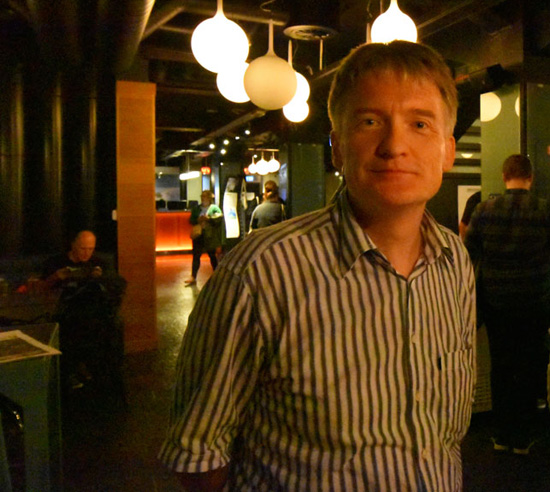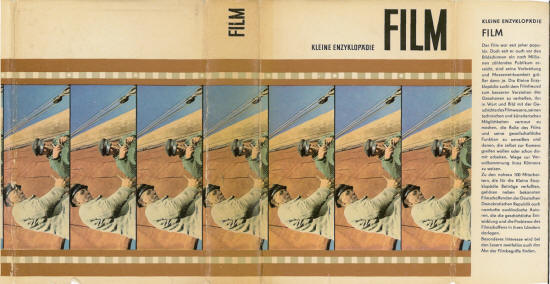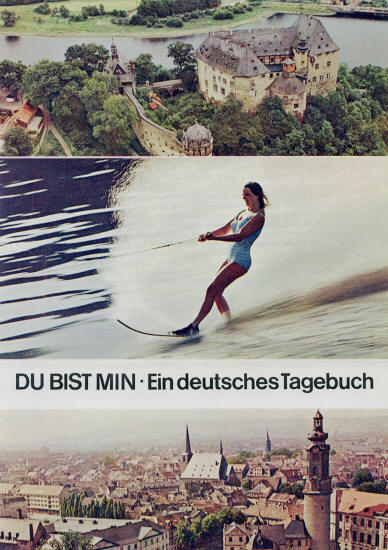DEFA 70 – More than just a question of the format! |
Read more at in70mm.com The 70mm Newsletter |
| Written by: Ingolf Vonau, Berlin, 2017 | Date: 06.09.2017 |
 In
Oslo to present DEFA's 70mm heritage in August 2017, Berlin's leading 70mm
expert extraordinare, DEFA 70 specialist and regular in70mm.com contributor for 20 years;
Mr Ingolf Vonau, Berlin. Picture by Thomas Hauerslev In
Oslo to present DEFA's 70mm heritage in August 2017, Berlin's leading 70mm
expert extraordinare, DEFA 70 specialist and regular in70mm.com contributor for 20 years;
Mr Ingolf Vonau, Berlin. Picture by Thomas HauerslevThe 70mm film festival of the Oslo Cinemateket enables a unique journey of discovery into the history of the 70mm film strip from the other side of the “Iron Curtain”, Eastern Germany. With special thanks to the curator of the 70mm film festival and cinema inspector of the Oslo Cinemateket Mr. Jan Olsen for his open-mindedness! DEFA film history was never apolitical. Film and politics in East Germany were inextricably connected. Cinema was understood as an ideological and cultural conveying institution under an absolute leadership of the communist party and their hierarchical administrative practice. The motive for voluntary cinema visits by patrons was the same in the east and the west: A desire for entertainment. However, the numbers of visitors had been decreasing during the sixties due to the spread of television in the east and the west. The focus of the DEFA 70mm project was, therefore, to maintain the attractiveness of cinema going, and to enhance it with 70mm wide film technology. |
More in 70mm reading: 12th Oslo 70mm Festival, August/September 2017 • DEFA 70 Films • Looking for DEFA 70 • "Orpheus in the Underworld" • DEFA 70mm in Oslo • 9. Todd-AO 70mm-Festival Internet link: arsenal-berlin.de filmmuseum-potsdam.de |
 Meeting
in 2017 with Otto Hanisch, director of photography on "Signale", and his
original script with all his hand written visual notes. A very nice talk.
Picture by Ingolf Vonau Meeting
in 2017 with Otto Hanisch, director of photography on "Signale", and his
original script with all his hand written visual notes. A very nice talk.
Picture by Ingolf VonauTo produce and present film on a world class level would mean, so the theory went, international recognition and attention for the East’s “Planned Society” system through such a prestigious venture. Thereby the East German film people had a joke: “...Only the big nations with the letter U in their name have used the most ornate expensive 70mm technology for the production of movies – the US, the USSR and OUR GDR...” People with passion for film and cinema have designed these movies! Some of these creators were contacted prior to the screenings. They do feel honored that their film history will be shown. Their names are: Annelie Thorndike (director DU BIST MIN), Carmen Bärwaldt (assistant with Konrad Wolf), Goijko Mitic’ (actor SIGNALE), Otto Hanisch (director of photography SIGNALE), Günter Stockmann (constructor 70mm camera DEFA 70 Reflex), Ullrich Illing (Head of sound department at DEFA Studio Babelsberg). 4 DEFA 70mm productions with 6-channel sound design will be shown in the film series of the Cinemateket along with the various American blockbuster productions. All German films are going to presented in the native German language, with added English subtitles: |
|
DEFA 70 |
|
 Pictures
from a scanned book cover. “Kleine Enzyklopädie FILM", published by
VEB Bibliographsches Institut, Leipzig 1966, 916 pages. Bought this around
1979 in a small bookshop in Beeskow. I liked the cover! Probably my first
encounter of 70mm. For the cover graphic, it mentioned inside: Filmstrip
DEFA artistic group Thorndike. Pictures
from a scanned book cover. “Kleine Enzyklopädie FILM", published by
VEB Bibliographsches Institut, Leipzig 1966, 916 pages. Bought this around
1979 in a small bookshop in Beeskow. I liked the cover! Probably my first
encounter of 70mm. For the cover graphic, it mentioned inside: Filmstrip
DEFA artistic group Thorndike.DEFA 70 (1967, director/director of photography: Werner Bergmann) A 1965/66 shot experimental, or demonstration, film with documentary and feature film action to introduce the 70mm technology. It was also seen as a pre-study for the Konrad Wolf’s project GOYA, by his director of photography Werner Bergmann. 33 minutes, and was theatrically shown together with Russian movie “War and Peace” 2. part “Natasha”. |
|
Goya – oder der arge Weg der Erkenntnis |
|
 Goya – oder der arge Weg der Erkenntnis (Goya or the Hard Way to Enlightenment) (1971, director: Konrad Wolf, director of photography: Werner Bergmann, Konstantin Ryshow) Unconventional adaption of Lion Feuchtwanger's novel about the Spanish court painter Francisco de Goya. A movie about the artist's position in the court of power, conceived by the screenwriter Angel Wagenstein. It was the largest, most ambitious and most expensive project of the dramatic films created in the history of DEFA. There was an ill-fated attempt to produce the film with some western partners, but that never came to pass. Ultimately, the movie was produced in cooperation with the Russian studio LENFILM in Leningrad (USSR). |
|
Signale – Ein Weltraumabenteuer |
|
 "Signale"
actor Mr. Gojko Mitić (left) and Esther Virgens (right) informing him about
the Oslo 70mm "Signale" screening (Delphi Filmpalast, Berlin December 2016).
Picture by Ingolf Vonau "Signale"
actor Mr. Gojko Mitić (left) and Esther Virgens (right) informing him about
the Oslo 70mm "Signale" screening (Delphi Filmpalast, Berlin December 2016).
Picture by Ingolf VonauSignale – Ein Weltraumabenteuer (Signals – A Space Adventure) (1970, director: Gottfried Kolditz, director of photography: Otto Hanisch) Being a work of the utopian film genre, “Signale” tries to show a world of tomorrow, featuring life and work in space, as a clear counterpoint to the several western genre representations. The movie is based on the book “Asteroidenjäger” (“Asteroid hunter”) by the East German science fiction author Carlos Rasch as a co-production with Film-Polski Poland. Technical tricks aplenty, and visually strongly influenced by Kubrick's "2OO1 – A Space Odyssey”. Photography- and special effects work received the most important award of the UNIATEC 1971 in Paris. The subharchord, a unique electronic instrument, was used for the soundtrack and the space sounds. |
|
Du bist Min – Ein deutsches Tagebuch |
|
 Du
bist Min – Ein deutsches Tagebuch (You Are Mine – A German Diary) Du
bist Min – Ein deutsches Tagebuch (You Are Mine – A German Diary)(1969, director: Annelie & Andrew Thorndike, director of photography: Ernst Oeltze at al.) The history of DEFA 70mm should begin also with a cinematic spectacle of a documentary film – The project “The Germans”. It ought to be a highly political, poetically visual film about the real German miracle – The existence and legitimacy of the GDR as a part of the cultural history of Germany. Photography took place in East Germany as well as West Germany with expressly hired cinematographers after preparations over several years. The film was finished in summer 1968. Unfortunately, this version of the film was never allowed to be generally shown. After the armed suppression that year of the Prague Spring, the world view of the political governance changed. The radical delineation to the other part of Germany became political verdict. The leadership of the party demanded a complete change of the film. Annelie and Andrew Thorndike as filmmaker obeyed. Scenes with western topics of Rhein, Ruhr, Hamburg, Hamelin etc. were almost entirely removed. Through a new commentary, an unusual montage of the historical material and inserted pictures of the "socialist construction", the project becomes the confessional film of the twenty-year GDR development. From the great original visual design remained a pathetic panorama accompanied by sentimental diary notes, with occasionally seductive beautiful pictures and impressively rare aerial photographs. The movie was renamed, now “Du bist Min – Ein deutsches Tagebuch” (You Are Mine – A German Diary). The premiere at the Moscow film festival 1969 was honored with a special award. After producing in total 7 fictional films and 3 documentaries by 1974, subsequently 70mm productions of DEFA ceased; from that point, everything was restricted to 35mm, due to financial concerns. Politicians henceforth preferred television instead of cinema as the medium of choice to ideological influence the masses. |
|
Thanks |
|
|
Many thanks to all who helped with translation
and English subtitling, trailer work and special DCP creation for “Signale”
screening! These are: Astrid Vonau, Lisa Marie Bardoux, Juliana Grell, Esther Virgens, Daniel Stephan, Joseph Clyne, Torsten Guhl, Simon Olliges and especially Paul Rayton. |
|
| Go: back - top - back issues - news index Updated 22-01-25 |
